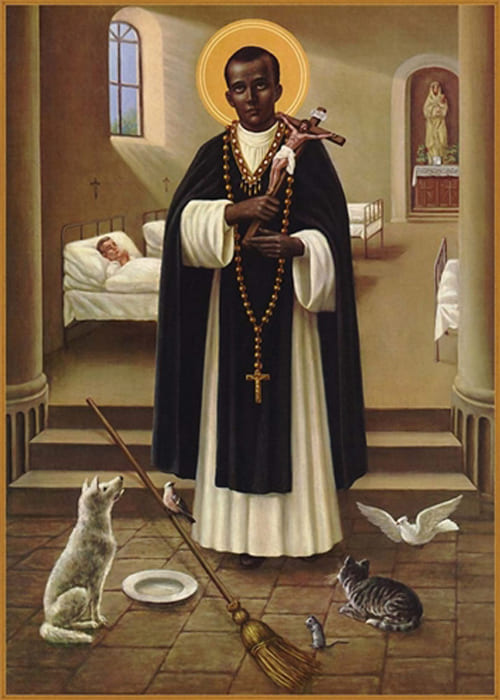
St. Martin de Porres was a Peruvian black, but Catholics of both South and North America have adopted him as patron and symbol of the Africans who came to the Americas out of force, not out of choice.
Martin was the son of Anna Velasquez, a free black woman, and a white father. The baptismal record said the father was unknown. Actually, he was John de Porres, a knight of noble family. He was repelled, we are told, when he saw that his son was so dark-skinned (what did he expect?). But, to his credit, eight years later he acknowledged the paternity of Martin and his younger sister, and promised to pay for their upbringing. Nevertheless, it was Anna who did the raising. The two children had little to aspire to in racist Lima.
Surprisingly, neither child grew up embittered. At age 12, Martin was apprenticed to a “surgeon,” at that time a combination of barber, druggist, physician and surgeon. Once trained, he began to use his skills to serve the poor. After four years he applied for entrance into the Dominican monastery of the Holy Rosary: not as a lay-brother (he was too humble to consider that) but as a lay helper.
By the end of nine years, however, he had so impressed the Dominican Fathers with his prayerfulness, humility and charity, that they urged him to become a lay-brother. He joined the community as such, and proved to be one of its glories.
Brother Martin was a model religious. His tasks may have been lowly, but his holiness transfigured them. Not only was he barber-clothier-nurse to his fellow-friars, he spread his ministry to the rest of Lima. Each day he distributed food to the hungry, he was doctor to the sick, and he helped to establish an orphanage and a hospice for abandoned infants. A good manager, he knew how to collect funds and budget them. He was happy to train others in his many small skills. For Martin, all people were God’s children. There was no distinction between rich or poor or white or black or red.
In addition to these human talents, God graced him with charismatic gifts: visions, ecstasies, bilocation (being two places at the same time), healing, supernatural understanding. Particularly notable was his rapport with lesser animals. Like St. Francis of Assisi, he treated them as brothers and sisters, and they did whatever he told them to do. His sister helped him by keeping an “orphanage” in her home for stray dogs and cats.
St. Martin’s fellow-Dominicans, even the priests, so respected his wisdom that they engaged him as their spiritual director. But if he consented to this unusual request, it was with a protest of his own unworthiness, calling himself a “poor slave” and even a “mulatto dog.” Indeed, once when his convent’s funds were low, he urged his superior to sell him into slavery, and use the price to balance the accounts.
Although Lima was a haughty city, it counted among its citizens in the same generation four remarkable saints who were friends of each other. St. Toribio, the archbishop; St. Rose of Lima; St. John Massias (another Dominican lay-brother); and St. Martin. Haughty or not, the people of Lima appreciated this quartet. When Martin de Porres died, prelates and noblemen vied for the honor of carrying him to his grave. Beatified in 1837, he was canonized in 1962.
We recall Jesus’ parable of the Good Samaritan: the man who, though himself a outcast, did not hesitate to help anybody who was in need. Martin de Porres was a latter-day Samaritan. For him the commandment to love neighbor ruled out any form of discrimination. Yes, even against birds and beasts and creatures that scurry through the dark. God made us all.
--Father Robert F. McNamara
(Year C) One day an aged beggar, covered with ulcers and almost naked, stretched out his hand, and Saint Martin, seeing the Divine Mendicant in him, took him to his own bed, paying no heed to the fact that he was not perfectly neat and clean. One of his brethren, considering he had gone too far in his charity, reproved him. Saint Martin replied: ‘Compassion, my dear Brother, is preferable to cleanliness. Reflect that with a little soap I can easily clean my bed covers, but even with a torrent of tears I would never wash from my soul the stain that my harshness toward the unfortunate would create.’ ” (Saint Martin de Porres, Religious; from Vie du Bienheureux Martin de Porrès, by Fr. Arthur M. Granger, O.P. , Dominican Press: St. Hyacinthe, 1941)
who chose Martin of Porres
to be an example of humble service,
overcoming the prejudice of the society in which he lived:
teach us the gifts of simplicity of life and holiness,
that in all our deeds
begun, continued and ended in Christ,
we may praise you
for the gift of your Son, Jesus the Lord,
who is alive and reigns with you,
in the unity of the Holy Spirit, one God,